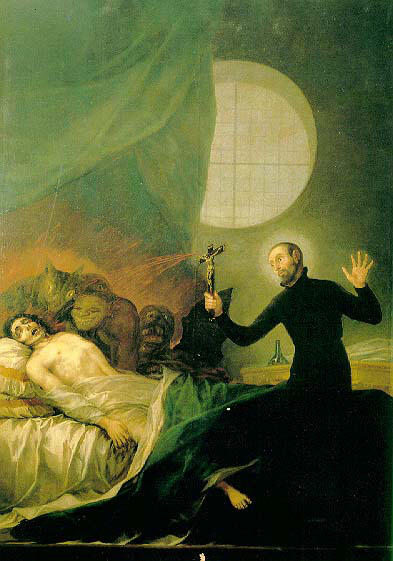Sept. 21, 2016
What's the real story behind exorcisms? VCU's Andrew Chesnut explains
Share this story

With a TV revival of “The Exorcist” set to debut Friday night on Fox, R. Andrew Chesnut, Ph.D., the Bishop Walter Sullivan Chair in Catholic Studies and a professor of religious studies in the School of World Studies in the College of Humanities and Sciences, has been giving interviews to the media about the real-life phenomenon of exorcisms.
Chesnut — author of the books “Born Again in Brazil: The Pentecostal Boom and the Pathogens of Poverty,” “Competitive Spirits: Latin America's New Religious Economy” and “Devoted to Death: Santa Muerte, the Skeleton Saint” — was featured this month in VICE’s articles: “Latin Is Still The Best Language for Fighting Satan,” “In the ’80s, the Devil Really Wanted You to Watch the Smurfs” and "The Globetrotter's Guide to Exorcism."
Chesnut spoke with VCU News about exorcisms, both those performed within the Catholic Church and those performed among Protestants.
You're frequently interviewed about Pope Francis and the Catholic Church. What is the pope's position on exorcisms?
As a Latin American, Pope Francis is big on exorcism.
As a Latin American, Pope Francis is big on exorcism. While exorcism is booming across the globe, it's especially popular in the Global South — Latin America, Africa and parts of Asia. In fact, the Argentine pontiff even performed an impromptu, informal exorcism on a demon-possessed Mexican parishioner shortly after becoming pope. I wrote about it in my Huffington Post column, “Pope Francis’ Informal Exorcism, Latin American Style.” Catholic exorcism was already booming under the papacies of St. John Paul II and Benedict XVI and it's done nothing but accelerate since Francis, the first Jesuit pope, took office.
You've said that charismatic Christianity has been behind a revival of exorcisms among Protestants. What exactly is charismatic Christianity?
Charismatic Christianity refers to both Protestants and Catholics who practice a faith centered on the work of the Holy Spirit and the so-called Gifts of the Holy Spirit. It was a new type of Protestantism, known as Pentecostalism, that first started offering a more Spirit-centered theology and practice a little over a century ago. Then, in the 1960s, Pentecostal-type worship was embraced by some mainline Protestant groups, mostly Presbyterian and Episcopalian, and segments of the Catholic Church in the U.S.
Today, the Catholic Charismatic Renewal, born at Duquesne University in Pittsburgh in 1967, is by far the leading Catholic lay movement in the world. For example, in the largest Catholic nation on earth, Brazil, 63 percent of Catholics are part of the Charismatic Renewal. The world's third largest Catholic Church, in the Philippines, is thoroughly Charismatic. Charismatic Christians are the ones most responsible for the current boom in exorcism worldwide.
Are Charismatic Christian exorcisms different from Catholicism's exorcisms? How so? And how common are they?

Catholic exorcisms tend to be more formal and ritualistic than Pentecostal ones. In theory, only a bishop or trained priest with his bishop's approval are authorized to perform exorcisms in the Catholic Church. However, I know from my own research in Brazil and Mexico that many lay women affiliated with the Charismatic Renewal perform unsanctioned exorcisms at Charismatic prayer meetings, where priests are usually not present. Pentecostal exorcisms are more spontaneous and unrestrained with pastors sometimes engaging wrestling matches with demon-afflicted individuals. Pentecostal exorcists also typically conduct interviews with the possessed individuals to find out which specific demons have manifested. In Latin America, Pentecostal exorcisms are often highly theatrical with ear-splitting screams from both the pastor and the demon-possessed.
Subscribe for free to the weekly VCU News email newsletter at http://newsletter.news.vcu.edu/ and receive a selection of stories, videos, photos, news clips and event listings in your inbox every Thursday.
Subscribe to VCU News
Subscribe to VCU News at newsletter.vcu.edu and receive a selection of stories, videos, photos, news clips and event listings in your inbox.








